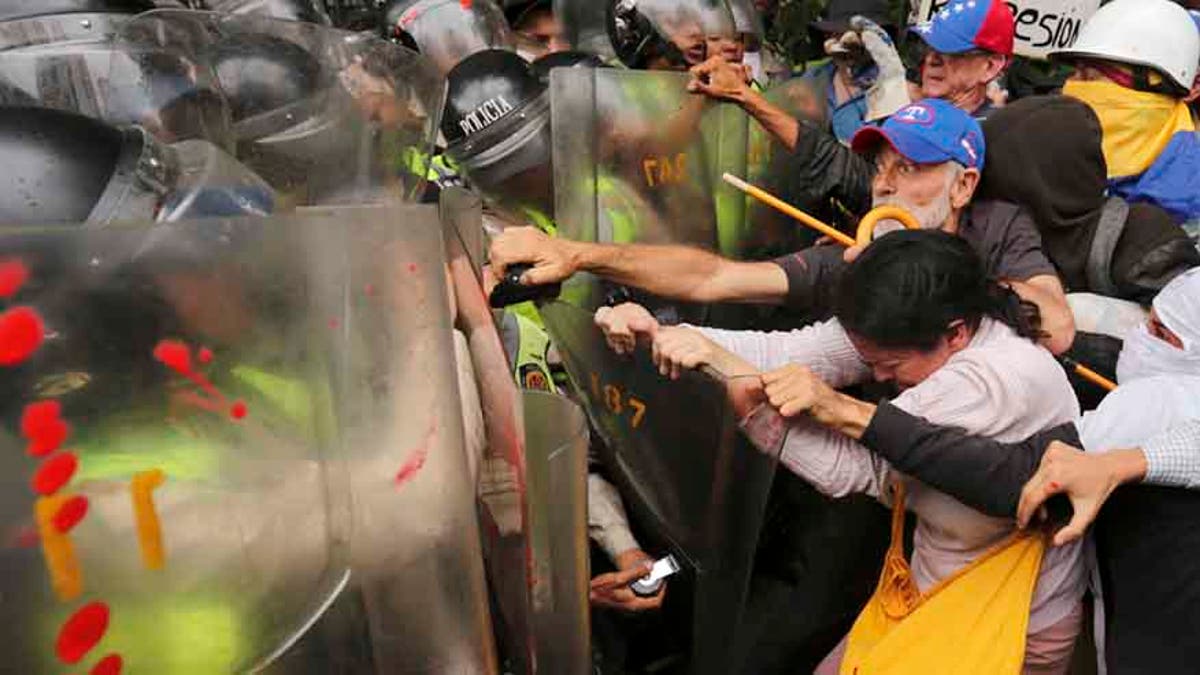A secret recording has surfaced of a Venezuelan regional command meeting in which a high-level military commander is heard issuing orders to prepare to use snipers against anti-government protesters.
The order by Venezuelan Army Division Gen. José Rafael Torrealba Pérez, which can be heard in a recording that was obtained by El Nuevo Herald, was issued as members of the country’s military brass also discussed the legality and risks of using snipers on anti-government protesters.
The meeting was held three weeks ago at a military base in the northwestern Venezuelan city of Barquisimeto.
“Begin to make preparations with those individuals that can serve as snipers, beginning with psychological and aptitude tests,” Torrealba told his peers in the army, air force and national guard who were in attendance. “There will come a time when we will have to employ them [the snipers] and I want us to be ready for the moment that we have to employ them because the president will not remain at a green [preparation] phase, gentlemen.”
Torrealba is purportedly referencing the Zamora Plan, a Venezuelan military strategy meant to be activated in the midst of an imminent foreign invasion.
The general’s voice matches the one heard on YouTube videos of his speeches, and he was identified as the speaker by the source who provided the recording to the Miami Herald’s Spanish-language newspaper.
Six weeks of anti-government unrest in Venezuela have resulted in at least 45 deaths, as well as hundreds of injuries and arrests in the worst turmoil of President Nicolás Maduro's four-year rule of the OPEC-member country.
Protesters are demanding elections to kick out the socialist government that they accuse of wrecking the economy and turning Venezuela into a dictatorship. Maduro, 54, the successor to late leader Hugo Chávez, says his foes are seeking a violent coup.
While one unnamed military leader objects to the use of snipers – arguing that if the marksmen are put on the street “all of us here will end up in jail” and adding that if a photograph of a sniper is taken the “media war is going to kill us” – it appears he was the only one in attendance to voice a dissenting opinion.
Torrealba, who acknowledges that the use of snipers would be unconstitutional, orders those present to go ahead with preparations anyhow as he believes it is the only way to keep demonstrators off the streets.
“It will only be us [the military] that pulls through because … once people start to see dead bodies, and dead bodies begin to appear, then everyone will begin to stay at home,” Torrealba said. “You will remember my words, the armed forces are the ones that have to solve this problem.”
Once people start to see dead bodies, and dead bodies begin to appear, then everyone will begin to stay at home.
The general’s comments from the April meeting contradict the recent public statements made by Venezuelan officials who claim that the nation’s military does not use firearms against the protestors.
“We don’t use lethal firearms. There are no rifles, handguns or machine guns,” Defense Minister Vladimir Padrino López said earlier this week during the announcement of the second phase of the Zamora Plan in the mountainous border state of Táchira. “In addition, President Nicolás Maduro, with his vision of statesman, and as president, has ordered us to recall even the weapons that are used for the restitution of order, which are shotguns with plastic munitions.”
Clashes and lootings raged overnight Wednesday in Táchira even though the government sent 2,000 troops to the state. Security forces fired tear gas at stone-throwing gangs, and crowds smashed their way into shops and offices in San Cristóbal, the state capital, and elsewhere.
Across the country four protestors were killed earlier this week and, while it is still unknown where the gunfire originated, the secretary of the Organization of American States, Luis Almargo, put the blame squarely on the country’s national guard.

Anti-government protesters scuffle with police blocking older Venezuelans from marching to the Ombudsman's Office in protest of President Nicolás Maduro in Caracas, Venezuela, Friday, May 12, 2017. (AP Photo/Fernando Llano)
“The Bolivarian National Guard and its head, Major General Benavides Torres, are directly responsible for the repression that has murdered, imprisoned and tortured people,” Almargo said in a statement. “The brutal repression shows the National Guard as the perpetrator of the violation of rights to life, freedom and guarantees of due process. Behind every detainee, every political prisoner, behind every person tortured and killed, there is someone institutionally responsible.”
Arrests have been made in just eight of the deaths, five of which involved police officers, according to the chief prosecutor's office. Maduro's government blames the opposition for the violence, saying they are purposely fomenting unrest in order to remove him from power. Opposition leaders deny that and say heavy-handed officers and armed, pro-government militias known as "colectivos" are responsible.
Shortly after a meeting on Thursday with Colombian President Juan Manuel Santos, the Trump administration announced sanctions against eight Venezuelan government officials on the nation's Supreme Court in an effort to support the Venezuelan people "in their efforts to protect and advance democratic governance."
“The stable and peaceful Venezuela is in the best interest of the entire hemisphere, and America stands with all of the people in our great hemisphere yearning to be free,” Trump said. “It is a very, very horrible problem. And from a humanitarian standpoint, it is like nothing we’ve seen in quite a long time.”
The Associated Press contributed to this report.




















